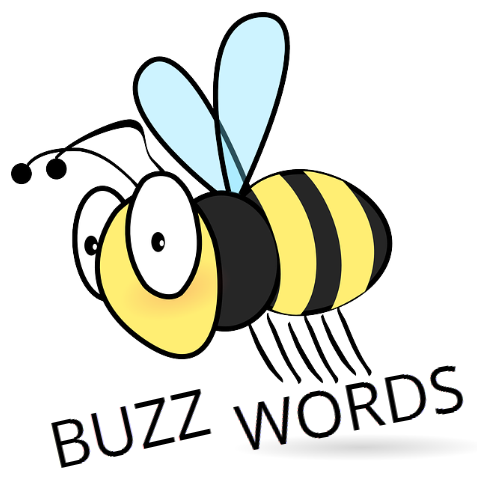
The Buzz About Buzzwords by Brittany Lyons highlights the pro's and con's of using buzzwords.
Anyone who's spent any time in the business world knows that regardless of your goals or plans to get there, if you don't have an air-tight presentation, you're dead in the water. Thus, it's unsurprising that thousands of different how-to articles, books or even whole courses have sprung up around the question of building a memorable presentation, and most of them heavily espouse the use of “buzz words.”
But what are these magic little words, and how do they really work? More importantly, what are the dangers of relying on them too much?
In many ways, buzz words are similar to jargon (industry-specific terminology).
For instance, they often refer to something within a specific field that is hard to understand for people who don't have PhDs on the subject. This conveys a sense of technical complexity and value without actually communicating meaning to the person listening, which lends the topic great weight while also leaving quite a bit of wiggle room for the presenter to change the details later.
The main reason it to...
A presenter chooses to utilize a buzz word is to engage a listener's attention and convince them that the concept being presented is worth their time and attention, even if they don't fully understand it and the details are kind of boring. They usually target key concepts within the idea that customers are sure to find attractive—things like “empowerment” or “globalization.”
Sometimes, the buzz word may not mean anything at all, but simply sounds powerful and dynamic. The most famous example is “synergy,” which is often ridiculed in TV sitcoms and stand-up comedy acts because no one can fully define it.
An unpopular idea
Buzz words are also particularly useful when presenting an idea that might not agree with the audience.
For example, if a company needed to downsize in order to meet budgeting restrictions, the presenter might say, “we need to streamline company operations.” What he or she really means is the company will have to fire people, but using the buzz phrase “streamline operations” makes it sound like a simple and painless process.
It's this kind of use that has earned buzz words a bad name in recent decades, and made their use risky.
In the mind of the public its a trick
Buzz word is now synonymous with the idea of Orwellian language—using positive words to mean negative things, thereby tricking people into thinking something that's completely wrong. Too often, businesses use buzz words in advertising to gloss over the grimy details of sub-par products, and it's made consumers wary.
Even the phrase itself has become a dirty word, indicative of deceit on the part of the salesman. To make matters worse, most of the really popular ones have become cliched, and therefore make it easy for a customer to spot the sales pitch. And customers do not like to buy sales pitches. They like to buy products.
The verdict
Buzz words are an effective tool, but only when used in moderation. One or two unique, carefully selected phrases can catch a customer's attention, and help them understand the benefits of the product.
More than that will start to confuse the information and put the customer on guard, which means that they won't trust you and they won't buy from you.
About the Author
Brittany Lyons aspires to be a psychology professor, but decided to take some time off from grad school to help people learn to navigate the academic lifestyle. She currently lives in Spokane, Washington, where she spends her time reading science fiction and walking her dog.